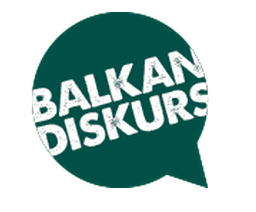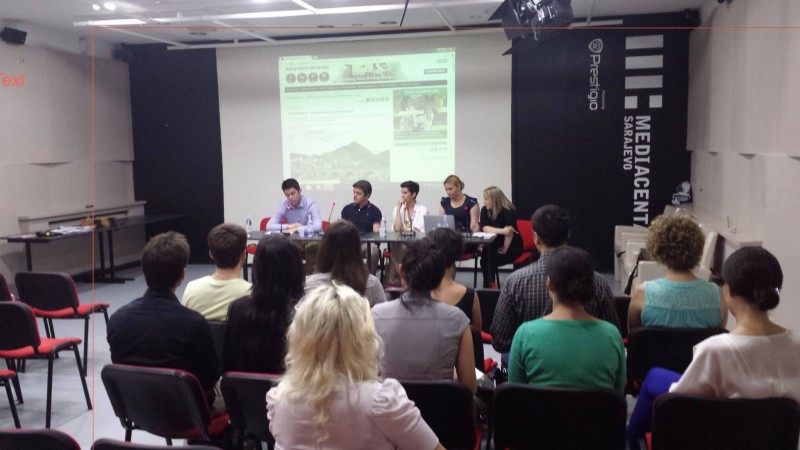Mainstream media in Bosnia and Herzegovina (BiH) is highly polarized along ethnic and political lines and often serves to exacerbate already existing ethnic divisions. Media often focus on events related to the war in the 1990s and exploit information to promote ethnic stereotypes and even stir up inter-ethnic tensions. Such reporting instills fear and mistrust between ethnic groups and greatly influences negative perceptions and attitudes towards members of other ethnic groups. Despite criticism and widespread beliefs that the media in BiH is poor in quality, many lack the knowledge or necessary tools to approach the information they receive critically or objectively. This can be especially true regarding Bosnian youth who are among those most vulnerable to the rhetoric of irresponsible leaders.
An Introduction to Bosnia’s Media Landscape
The signing of the Dayton Peace Agreement (DPA) in 1995 was successful in its efforts to end war in Bosnia, but it’s use as a permanent constitutional framework has resulted in the institutionalization of ethnic divisions. This division is made visible through the physical boundaries created by the allocation of territory as well as through the complex power-sharing arrangements set up between the country’s three constituent ethnic groups: the Bosnian Muslims (Bosniaks), Croats and Serbs. The country’s complex political structure operates on the three primary levels of state, entity and canton, where the entity takes precedence. BiH is split into two semi-independent constituent entities: the Federation of BiH, consisting of a Bosniak and Bosnian Croat majority, and the Republika Srpska (RS), whose population predominantly consists of Bosnian Serbs. The Federation entity is further divided into 10 cantons, and there also exists the District of Brčko, which is an independent unit that does not belong to either of the two entities. For a more detailed breakdown of Bosnia’s political system visit the K-143 website.
Bosnia’s convoluted political system has dictated the structure and nature of the country’s media landscape, and each entity has its own public broadcaster, private media, and political parties. The majority of Bosnian media is under political party control, and politicians actively manipulate the media, both for political gain and personal enrichment. They often promote antagonistic propaganda and divisive messages to maintain the status quo, which allows them to profit without being held accountable to Bosnia's citizens.
Journalists are subject to the pressures of the political parties and media owners (many of whom are political figures or affiliates). Ethnic and political pressures and loyalties influence media reporting and editorial decisions, including the time and space allocated to different news topics, especially those that are “sensitive” in nature—coverage of war crimes trials and rulings, genocide commemorations, and matters regarding contested histories. Such an atmosphere makes it difficult for journalists to apply proper investigative journalism techniques and deters them from speaking out publicly in an effort to hold those in power accountable for their actions and policies. Consequently, media coverage often fails to present more than one side of a story, and press ethnics need not apply as media representatives fail to distinguish between assumptions and facts or to provide a proper analysis of events. Journalists are not only pressured from the top-down, but also from the bottom-up. Ethnicity strongly influences the way people in Bosnia consume media: many Bosniaks rely on Sarajevo-based TV, radio and print media; the majority of Bosnian Serbs are geared towards RS- and Belgrade-based media; and Bosnian Croats tend to lean towards media from Croatia. Finally, when the media's boards of decision-makers, editors, and producers lack cultural, political, and ethnic diversity, their products become inherently biased.
Media has a strong influence on the Bosnian population, and many lack the tools necessary to approach the information they receive via the media critically and objectively. Youth are especially vulnerable to propaganda and media manipulation. Many youth often do not travel outside of their local towns and communities, which results in limited interaction with members from other ethnic groups. This significantly increases the likelihood that youth will form their opinions based on the messages and information they receive via the media. The media has and continues to leave a deep imprint on the collective opinion and on inter-ethnic relations in Bosnia, and problem of media manipulation must be addressed in order for this country to truly move towards reconciliation and renewed inter-ethnic cooperation.
PCRC’s Approach to Media Manipulation in Bosnia

Step 1: The “Balkandiskurs” Multimedia Platform
The Post-Conflict Research Center (PCRC) is taking steps to address the issue of media manipulation in Bosnia with its project “Media Literacy and Resisting Manipulation”. The first phase of this project involves the development of the multimedia web platform “Balkandiskurs”. Balkandiskurs is a regional network of writers, bloggers, multimedia artists, and activists who have come together in response to the lack of objective, relevant, invigorating, and independent regional media. The works published on this site will connect themes across borders and provide fresh and independent views on issues that matter to people in Bosnia and Herzegovina and the Western Balkans. The founders of Balkandiskurs have extensive experience in journalism, activism, video and multimedia production, and the NGO sector. Support for Balkandiskurs has been provided by the European Union Instrument for Pre-accession Assistance (IPA) through the Center for Independent Journalism Budapest (CIJ). This support included the provision of a network of regional partners, which includes the Human Rights House of Zagreb, the Association of Journalists of Macedonia, and the Independent Journalists’ Association of Vojvodina.
The platform will be dedicated to the effort of challenging stereotypes and providing a wide range of viewpoints and perspectives that can be found all in one place. Works will be published from a diverse group of contributors, including journalists, media experts, ordinary citizens, and youth to name a few. Some regular topics will include transitional justice, inequality, corruption, and human rights. Balkandiskurs will strive to make its content accessible and understandable for both local and international audiences. The Balkandiskurs site will go live in August of this year.

Step 2: Media Literacy & Resisting Manipulation Youth Workshops
PCRC recognizes that youth are not given the space to express their viewpoints or share their concerns, ideas, and opinions about the issues that directly affect them. We also believe it's extremely important that the youth’s voices are heard and that they are taken seriously as stakeholders and decision-makers in Bosnia’s transition and peacebuilding processes. PCRC has developed a youth training workshop that will combine investigative journalism with creative methods of storytelling to shed light on the consequences lack of integrity and transparency in the media have on society. We will be providing Bosnian youth participants with an opportunity to develop their skills journalism, fair and balanced reporting, and multimedia. This fall, PCRC will select 10 young Bosnians from across the country to participate in this 3-day workshop taking place in Sarajevo. Participants will have access to experts from a number of different fields during their time in Sarajevo. Once the participants have completed training, they will be given space to publish and promote their work on the Balkandiskurs platform about the topics that matter most to them, and without fear of censorship. PCRC will release an official call to apply in August, so stay tuned!
Author Leslie Woodward is co-founder & Project Director of the Post-Conflict Research Center (PCRC)



